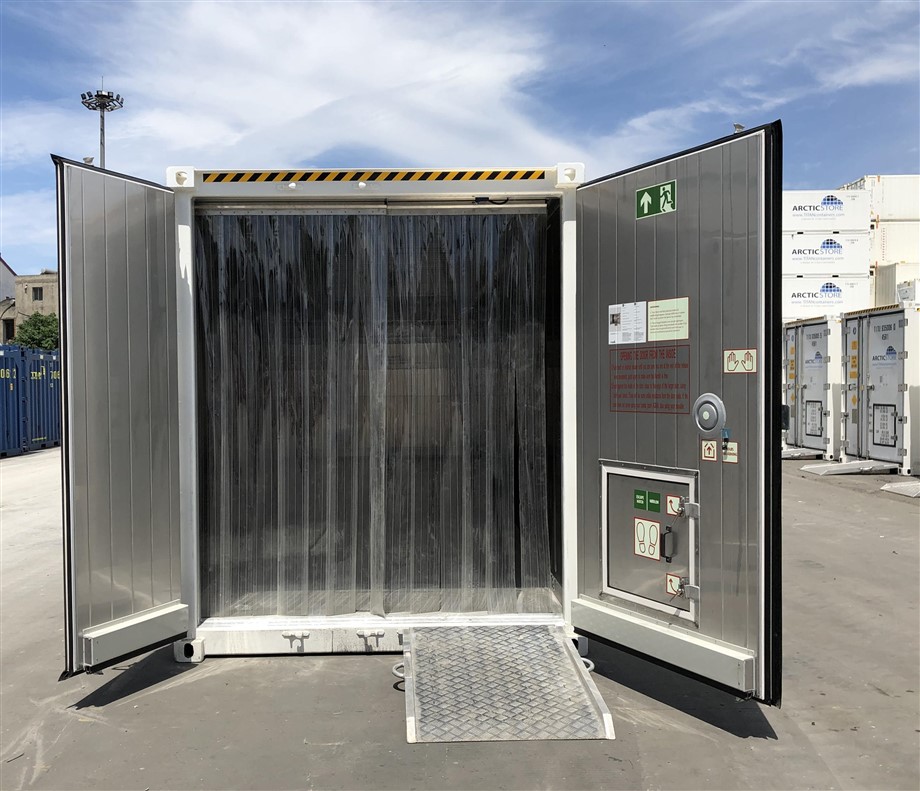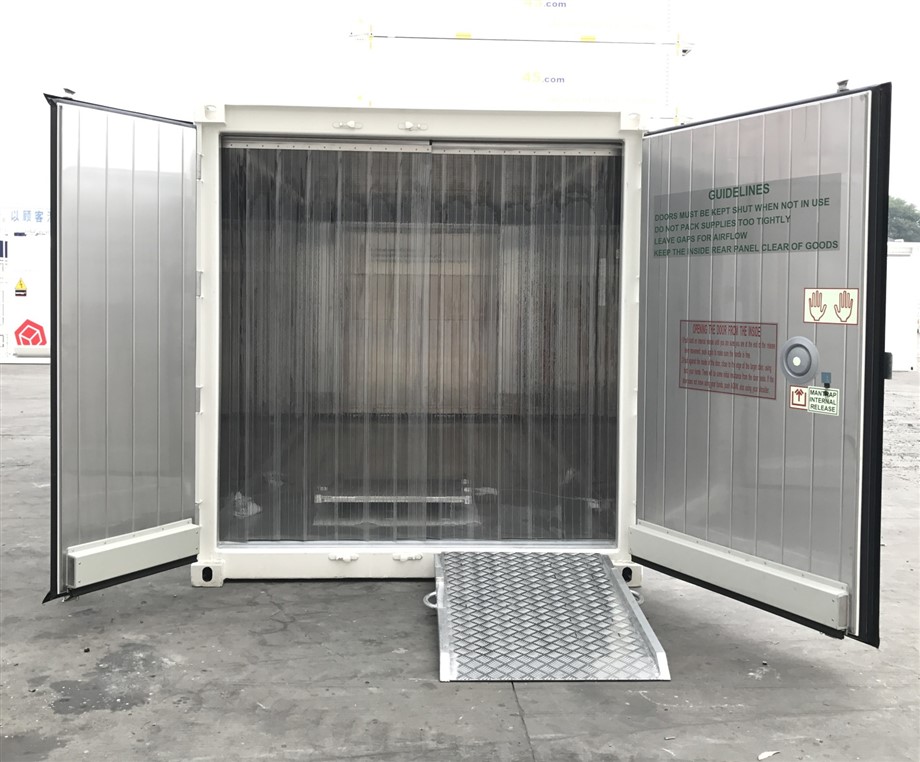All Regarding Freezer Containers: Essential Insights for Your Storage Space Demands
Cold storage containers play a vital function in the preservation of perishable goods. They come in different types, including chilled and insulated units, each developed for details storage needs. Recognizing the benefits and essential functions of these containers is vital for organizations intending to enhance their operations. As the demand for effective storage services expands, checking out the various choices readily available can lead to informed choices that impact both earnings and sustainability. What variables should one think about when picking the best container?
Sorts Of Freezer Containers
Freezer containers been available in numerous kinds, each made to satisfy particular temperature control needs. Among one of the most common types are cooled containers, which preserve temperature levels between 0 ° C to 10 ° C, making them suitable for perishable items like fruits, veggies, and dairy products. Another kind is the deep freezer container, which runs at temperatures listed below -18 ° C, perfect for lasting storage space of icy items such as meats and seafood.
Protected containers give temperature security without active air conditioning, making them beneficial for temporary transportation of temperature-sensitive products. In addition, there are mobile cold store systems, which offer adaptability in areas and are typically utilized in occasions or seasonal procedures. Finally, blast chillers quickly minimize the temperature level of hot foods, guaranteeing security and quality. Each kind serves an one-of-a-kind objective in different industries, from food service to drugs, emphasizing the relevance of choosing the ideal container for details storage needs.

Advantages of Making Use Of Freezer Solutions

In addition, freezer solutions prolong the service life of products, reducing waste and increasing productivity for businesses. By successfully managing supply with correct temperature level control, business can optimize their supply chains and boost operational effectiveness.
Additionally, freezer centers enable for flexible storage space alternatives, fitting various volume requirements and seasonal fluctuations popular (used 40ft refrigerated shipping containers). This flexibility helps services react promptly to market modifications
Lastly, employing cold store solutions can ensure compliance with wellness and security guidelines, securing both companies and consumers. Generally, the tactical use cool storage space enhances product management while promoting sustainability and economic stability.
Secret Attributes to Look for in Cold Storage Containers
When choosing cold store containers, numerous key features quality mindful consideration to protect peak performance and reliability. Temperature level control capabilities are essential; containers should maintain regular temperatures ideal for particular goods. Insulation high quality also plays a substantial duty, as superior insulation minimizes power intake and improves temperature level stability.
Next off, simplicity of accessibility and loading is vital; containers need to use easy to use styles for reliable handling and company. Durability is one more essential element; weather-resistant materials guarantee durability and secure contents versus environmental elements.
Additionally, mobility attributes, such as built-in wheels or raising points, assist in transportation, while customizable designs permit for tailored storage services.
Lastly, keeping track of systems, including temperature alarm systems and remote tracking, offer real-time updates, making particular that conditions continue to be optimal. By concentrating on these features, customers can select cool storage containers that satisfy their functional needs properly.
Selecting the Right Cold Storage Container for Your Demands
Picking the appropriate freezer container requires a thoughtful assessment of particular demands and functional demands. Elements such as the sort of items being kept, temperature level of sensitivity, and quantity ought to be focused on. For example, disposable food things may necessitate containers with rigorous temperature controls, while pharmaceuticals might need precise conditions to keep efficacy.
Furthermore, possible individuals must consider the container's size and flexibility. A bigger system may be needed for bulk storage space, while smaller sized, portable choices might be suitable for momentary or on-site needs. Insulation top quality and power effectiveness are additionally crucial, as these will certainly impact operational costs and temperature level stability.
Compliance with market regulations and criteria is important, specifically in sectors like food and health care. By carefully assessing these elements, users can choose a cold store container that successfully meets their one-of-a-kind needs and warranties ideal storage problems.
Finest Practices for Keeping Cold Store Conditions
Preserving ideal cold store problems is essential for preserving the high quality and safety and security of temperature-sensitive products. On a regular basis monitoring temperature and moisture degrees is crucial; making use of reliable digital thermostats and hygrometers can provide accurate analyses. Additionally, proper insulation of cold store containers helps minimize temperature fluctuations and power loss.
Implementing a first-in, first-out (FIFO) system ensures that older stock is utilized before more recent supply, lowering waste (used 40ft refrigerated click here shipping containers). Furthermore, maintaining an arranged design within the storage room allows for much better air movement and minimizes the threat of cross-contamination
Routine maintenance examine devices, such as compressors and seals, are essential to avoid malfunctions. Staff training on best techniques for loading and dumping items helps maintain temperature level honesty. Ultimately, maintaining doors shut as high as possible restrictions warmth exchange, ensuring that the chilly storage space environment continues to be steady and efficient in preserving important products.
Cost Factors To Consider for Cold Storage Solutions
When examining freezer options, it is necessary to think about the preliminary investment expenses along with ongoing functional expenses. A complete breakdown of these expenses can disclose significant long-lasting cost savings potential for services. Understanding these monetary elements assists stakeholders make educated decisions regarding their cold store requirements.

First Investment Expenses
The economic landscape of cold store containers presents various preliminary investment costs that companies must consider. These prices typically consist of the purchase or rental rate of the containers, which can vary based upon type, size, and insulation quality. In addition, costs connected to retrofitting existing structures to fit cool storage space should be factored in, specifically if specialized tools is called for. Setup costs, consisting of electric work and refrigeration systems, also contribute to the overall first financial investment. Services should not overlook transport expenses for supplying containers to their desired area. Prospective modification options, such as shelving or temperature monitoring systems, can additionally affect the initial economic outlay. Cautious budgeting for these variables is important for effective cold store implementation.
Functional Expenses Malfunction
Operational expenditures for chilly storage remedies encompass several important price factors to consider that companies have to navigate. Secret aspects include energy costs, which can be substantial due to the need to keep reduced temperature levels. Upkeep costs are additionally significant, as routine maintenance is important to guarantee equipment runs effectively and stays compliant with wellness and safety and security criteria. Furthermore, labor costs might develop from the demand for specialized staff to keep track of the storage and handle setting. Insurance coverage expenditures are one more factor to consider, as business should secure their financial investments versus possible losses. Finally, any possible regulative conformity prices need to be factored in, as organizations might need to purchase systems that comply with food safety and security and ecological policies. Understanding these expenditures is crucial for reliable budgeting.
Long-Term Financial Savings Prospective
Purchasing cold store services offers significant lasting savings possibility, transforming initial expenditures right into financial performance gradually. By minimizing putridity and waste, businesses can improve their earnings margins significantly. Advanced insulation and energy-efficient systems decrease energy prices, which accumulate over the life-span of the equipment. Cold storage space containers frequently call for less regular maintenance contrasted to conventional refrigeration methods, leading to lower repair work costs. The ability to shop items for prolonged durations without jeopardizing top quality allows businesses to maximize market fluctuations, maximizing profits. Additionally, the scalability of chilly storage services makes it possible for business to adapt to transforming demands without sustaining too much expenses. Generally, these variables add to an engaging case for freezer as an affordable financial investment technique.
Frequently Asked Questions
How Much Time Can Food Be Saved in Freezer Containers?
The duration food can be stored in cold store containers differs by kind. Generally, perishable products last from days to weeks, while frozen foods can continue to be risk-free for months, relying on proper temperature and storage problems.
Are Cold Store Containers Energy-Efficient?
The power performance of cool storage space containers varies based on design and insulation quality. Modern devices usually use sophisticated modern technology to reduce power intake, eventually adding to decreased functional expenses and ecological effect in long-lasting use.
Can Cold Store Containers Be Personalized for Certain Requirements?
Freezer containers can certainly be tailored to meet certain demands. Alterations might include temperature level controls, size adjustments, and added attributes, enabling users to customize options successfully for different storage space demands and functional choices.
What Are the Typical Sizes of Cold Store Containers?
Cold storage space containers typically come in conventional dimensions such as 10, 20, and 40 feet. These measurements accommodate numerous storage space demands, ensuring versatility for companies needing temperature-controlled environments for disposable items or sensitive materials.
Do Cold Store Containers Require Special Authorizations for Use?
Freezer containers typically call for special authorizations for use, depending on local laws and planned applications. Authorities may mandate authorizations to guarantee safety and security requirements, environmental conformity, and correct functional techniques are kept throughout their use.
Cold storage space containers come in various kinds, each developed to fulfill certain temperature level control requirements. Furthermore, cold storage space facilities enable for versatile storage space alternatives, suiting numerous volume demands and seasonal fluctuations in need. Choosing the ideal cool storage container calls for a thoughtful assessment of operational requirements and specific demands. The monetary landscape of cold storage space containers offers different preliminary financial investment prices that services have to take into consideration. Cold storage containers can without a doubt be tailored to satisfy particular needs.